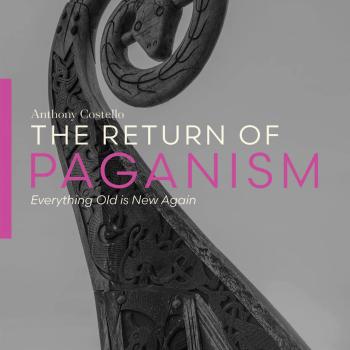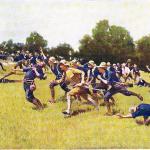I was just reading John Beckett’s Must We Speak No Ill of the Dead? And it made me remember several things about this topic. As Beckett clearly says in his post, people get the courage they need now and then to say many things by being behind a keyboard and protected by a screen. It’s true that hiding behind a curtain helps in some regard, as it does for me to speak about pre-Islamic beliefs and witchcraft inspired by it, but when something tragic happens not all the comments we hear are acceptable, internet or not included.

The Only Responsibles
We recently suffered many losses in my family, many deaths, one after the other. We were all in pain, some more than others, but we were all hurting and suffering, asking why some of those people had so unfair deaths, why they had to go in such tragic ways until we got our emotions under control. People say hurtful things when they are hurt, sometimes they tell the truth, but sometimes the situation makes us show our worst face to the world.
I’ve heard that words are gone with the wind, but the written things remain. False. The words we speak and the acts we make are the things people will remember the most. The way we treat others will leave an impression on their memories, and they’re going to speak for sure when we’re no longer here. I have seen it done, and I have done it as well, and I expect people who got to know me to do it for sure. Oscar Wilde said that “there is only one thing in life worse than being talked about, and that is not being talked about”, and I agree.
We are the only responsible people for what others will say about us, how they will remember us, although it is impossible to fully know someone. The more you do, the more chances you will leave an impression on someone, your own legacy, the way others look at you, either as an example of what to do, what not to be like, or just like someone who went through life without doing anything remarkable or worth noticing. I am afraid… Ok, no, terrified, of being forgotten, so I always make sure to leave an impression on others, and I always aim for the best one. I want to be remembered as someone who healed, helped, and was kind, someone who tried to be the best version of himself every day despite his mistakes.

Suffering-Based Talk
However, I have also noted that when someone speaks ill of the dead is because they are suffering in a way or the other. They have a problem with forgiveness and need to be done with it, but as long as they remain ignorant they won’t get the healing they don’t know they need. Sometimes, it’s easier to criticize and blame someone else instead of ourselves, instead of doing the dirty job of healing and letting our traumas go. Sometimes it is even fun for some people, although I fail to see how that would be the case.
It was my case when my dad died. It was easier to blame him for so many things that I simply didn’t do my job, didn’t grow up, didn’t get to see things clearly. I felt I had been robbed of something special, and I had in many ways, but I still had that desire to get revenge. I was so hurt for so many things, and now that I didn’t have the chance to talk with him, it was easier to hate and be angry than to heal, accept, forgive, and forget. It takes a long time, and much more if you are in denial.
People speak because they feel the need to be heard, because they need to say what they think, and because they like the attention. Some of us don’t like it that much, but we still like to feel important now and then. When someone says nasty, mean things about someone dead, I’m inclined to think they have an unfinished business relating to this person, and I’m speaking about the living, of course.

Impossible to Stop People from Speaking
It’s impossible to stop people from speaking, and we are no one to tell them how to remember someone. We all have our memories, good and bad, great and despicable, of people we’ve known in our lives, but we can share the good ones when people are hurt, just to give them some understanding and sympathy. I don’t share any memories and respect others’ pain during that time, and just let them tell as many tales and memories as they want if I am with them because it is not my time to speak but theirs.
After a while, when things have calmed down, I’m more confident about what to say and not, and to whom I say those things. I know what I can talk about and with who, and if someone tells me something I know if it is true or not depending on the person. Recently, someone said awful things about my father, someone I love and respect. Of course, I defended him and tried to make this person see that I knew my dad, that I know the kind of person he was, but they were adamant about their opinion. Why was I going to lose my time?
I’ve learned that people can’t give what they don’t have, and that includes me. When I’m not feeling calm, I can’t give that, and when I let someone else make me feel in a certain way, I start acting, speaking, and thinking like them. You would be surprised at how much information you can get if you pay attention to what others say and how they say it. This person I mentioned before has always tried to be placed in a position of high esteem, tried to be an example, and while sometimes they have done it with a noble heart, sometimes they showed to me how insecure they feel sometimes.
When this person spoke ill of my own father in my face and paid no attention to what I said, I got to see that they simply wanted to give me some advice, maybe not in the best way (quite the opposite, if you ask me), but tried to do it nonetheless. I was raised to keep the good and discard the bad as much as possible, and that’s what I do every day. If someone speaks ill of the dead, then I just listen and see what that person is revealing about themselves. Some say the dead can’t defend themselves because they are not here, but they don’t need to. That’s what we are here for.


















